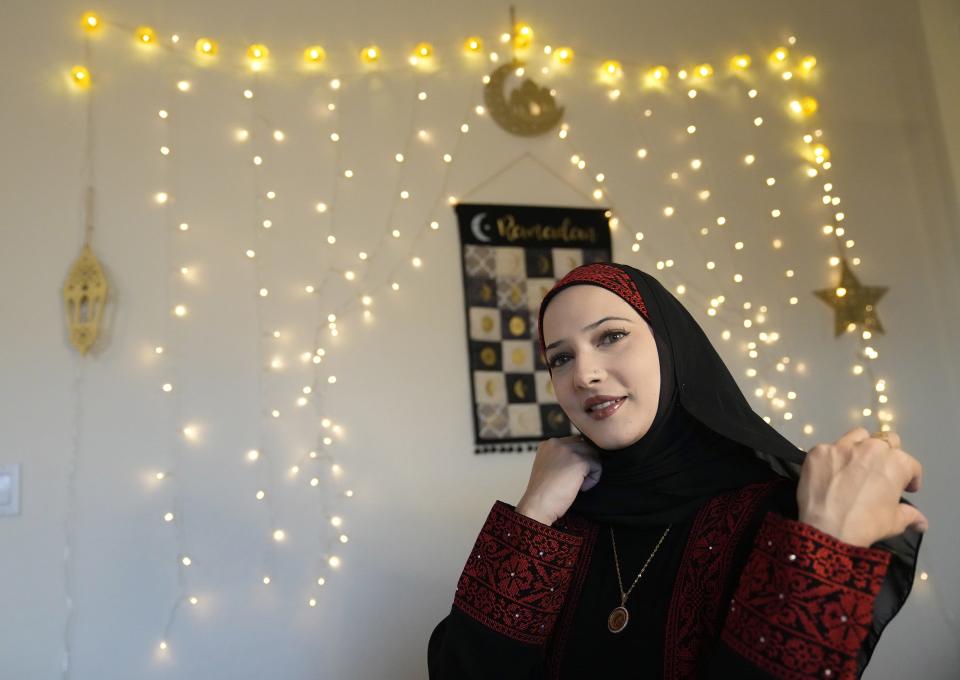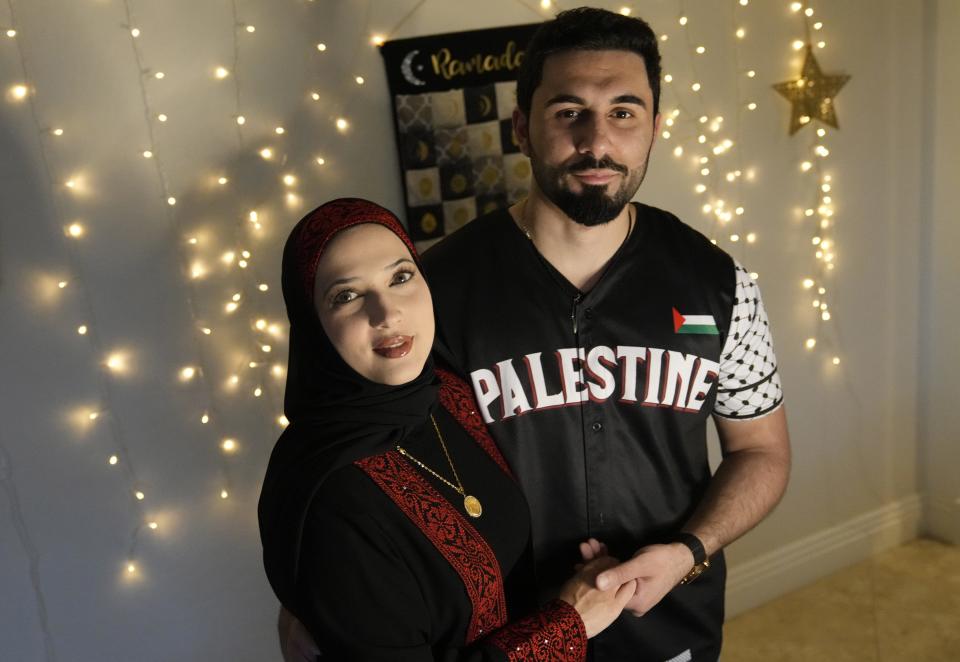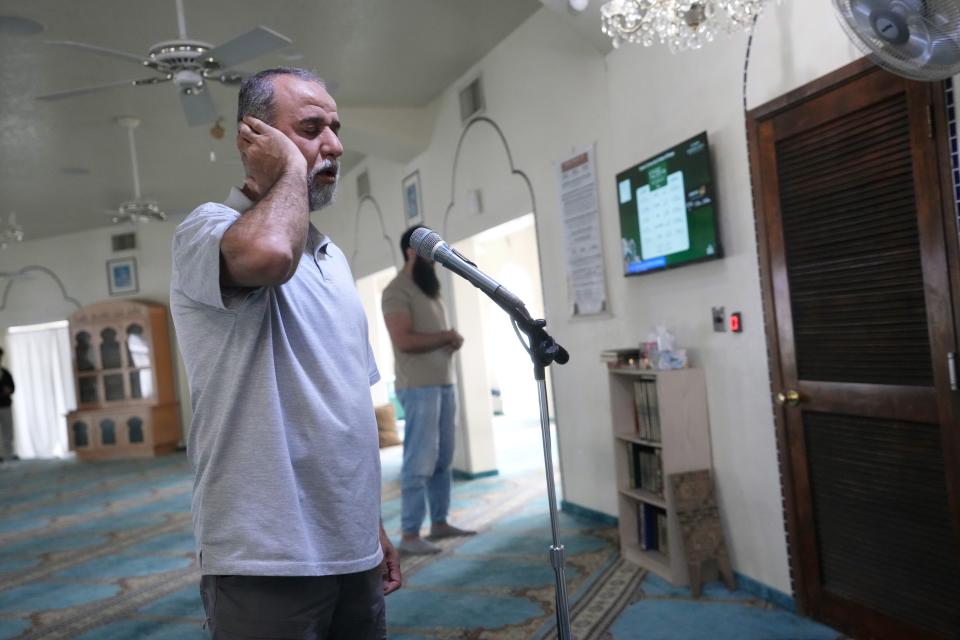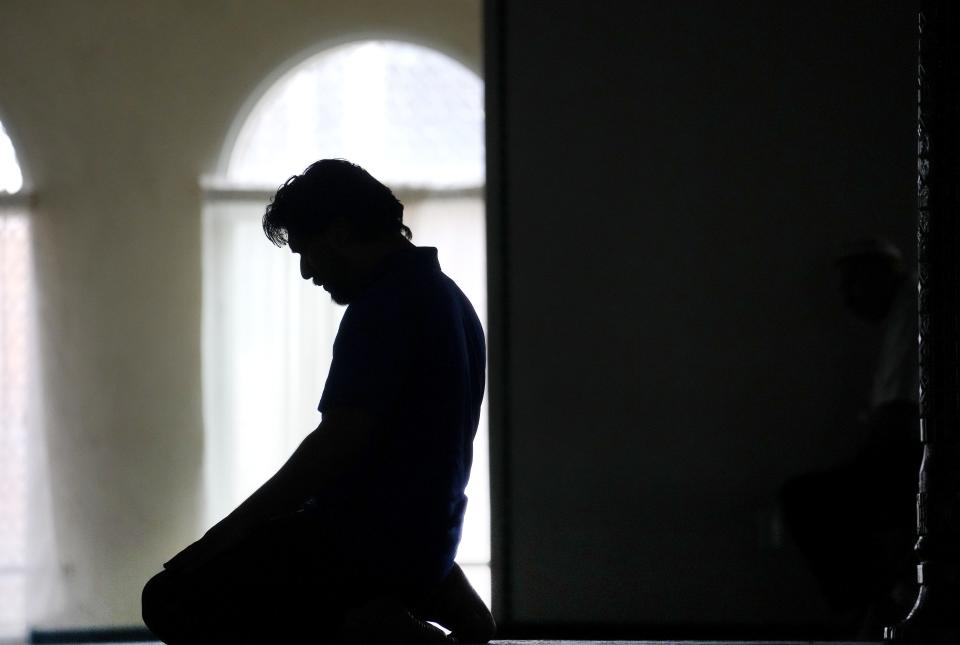As Ramadan begins, Arizonans with Palestinian roots are holding onto hope. Here's how
Like most kids, Gilbert resident Rowan Imran’s 4-year-old daughter is a fan of Curious George.
The young girl’s mom has been reading her "It’s Ramadan, Curious George." In the colorful picture book, the monkey explains to children the Islamic month of sacrifice marked by fasting and prayers that begins Sunday, March 10, and concludes Tuesday, April 9.
Imran and other Valley residents of Palestinian descent discussed with The Arizona Republic how they retain a bond with their homeland amid the hardships and happiness found there.

"Every tradition that they have there, I grew up with here. And I try my best to keep it all for my daughter now — the same traditions that we do in Palestine," Imran said. Recalling advice her own mother gave her, the 32-year-old Imran said, "You're from here and you're American, you're also Palestinian. You have to keep these traditions alive."
The war between Israel and Hamas has drawn out a humanitarian crisis in the Palestinian territory of Gaza. War broke out after Hamas’ Oct. 7 raid on Israel. According to the Israeli government, 1,200 died at the hands of the militant group, with at least 30 of the 250 hostages taken said to be dead.
As of March 4, more than 30,000 Palestinians have been killed, including combatants, in Gaza, according to the Gaza Health Ministry. More than 70,000 people have been wounded. The war has displaced 80% of the 2.3 million Gaza residents, according to the health ministry. The United Nations warned that a quarter of Gaza's population is at risk of starving.
Without cause
Palestinians confront daily burdens under the decades-long Israeli occupation, Palestinian Americans told The Republic.
Imran detailed how her grandfather, who is in his 70s and lives in the heavily militarized West Bank, is in colon cancer remission and refuses to leave his home fearing the Israel Defense Forces will strike him with tear gas. Israeli forces have killed nearly 400 Palestinians in the West Bank since Oct. 7, according to Palestinian health officials.
"They kind of just put this terror in everyone’s hearts," Imran said of the Israel Defense Forces. "It’s difficult."
Ahmad Riyad, a 19-year-old from Gilbert, said his father, Mohammad Riyad, has told him about how the military group detained him for up to two hours without cause multiple times while the now 47-year-old was between 12 and 15 and living in the West Bank. Ahmad Riyad was in high school when he visited family there during Ramadan.
"It’s not safe. You don’t know what’s going to happen," he said of the West Bank.
Imran and Riyad pointed to relatives enduring warrantless raids by the Israel Defense Forces, their belongings confiscated or damaged as soldiers rummaged through their homes. They said their families dealt with undue detention and questioning by the military group.
Learning of his dad's struggles emboldened Riyad when he turned 13 and was allowed to fast during Ramadan.
"I was able to stand alongside my father," Riyad said.
Reclaiming identity
Phoenix-area Palestinian Americans also highlighted how community and customs lift the Palestinian spirit.

They remembered bright days visiting Palestinian territories. They recalled a whiff of a street vendor’s spit-roasting lamb meat breezing through a bustling street where children played and friends pulled up in their cars to chat with each other. They thought back on families gathered on rooftops in the late afternoon, sipping coffee and bantering with each other.
"One thing I've always noticed is how content they (Palestinians) are with life no matter what is happening," said Imran, who enjoys U.S. and Palestinian citizenship and often travels to her parent’s home country.
The early summer sunlight shone on the golden Dome of the Rock when Haveen Qarini first caught sight of the more than 1,300-year-old shrine at the heart of the Al-Aqsa Mosque. She was there on a June 2016 visit to Jerusalem and still marvels at just how pristine she found the tree-lined roads there.
"First time going to my own homeland," Qarini said, her voice slightly rising.
These past five months have pushed the 29-year-old Peoria resident to learn more about the history of the Israeli-Palestinian conflict.
Qarini’s own family was part of the mass flight from what is now the state of Israel following the 1948 war there. Known as Nakba, or catastrophe, the resulting exodus led to Qarini’s parents being born in Kuwait and Jordan.
This has left Qarini striving to reclaim her Palestinian identity. For instance, she wore the thobe, a traditional Palestinian woman’s dress, during her 2018 engagement to her Palestinian American husband.
"I’m heritage-stripped," Qarini said. "I have to work hard to know where I'm from, to hold on to my culture."
Faithful abstain
There are approximately 8,000 Arizona residents of Palestinian origin, according to estimates by the Phoenix-based Palestinian American Community Center.

The figures are nearly split evenly between those born and raised in the state and those who immigrated here, Mohammad Riyad, the community center’s founder, detailed. More than half of the Palestinian immigrants have resided in Arizona for 20 years or more.
Mohammad Riyad, who immigrated 25 years ago, mentioned the first known Palestinian family in Arizona arrived in the late 1970s.
Regardless of where they call home, Palestinians are at their most united during Ramadan, Ahmad Riyad assured.
Based on the Islamic lunar calendar, Ramadan’s date changes yearly. From sunrise to sunset, the faithful abstain from food and drink and focus on prayer. Those observing Ramadan also avoid reactionary emotions, explained Yasmin Saikia, an Arizona State University history professor.
This "reinforces and strengthens" a belief in "God, but also the unity of the community" and to the observer becoming "more compassionate to people who have less," Saikia said.
Ramadan is "not just an individual, disciplining themselves," but is also about community coming together to break the fast and pray at a mosque, added Chad Haines, an ASU religious studies associate professor.

Both professors are Muslim and co-directors of ASU’s Center of Muslim Experience in the United States. Saikia is Indian American, while Haines is of English and Italian descent.
Haines described Muslims in the U.S. as the most diverse outside of Mecca. During Eid al-Fitr, the end of Ramadan, Haines said distinct "colors and cultures" come together at about 19 mosques throughout the Valley. The more than 100,000 Phoenix-area Muslims make for a rich tapestry of different national and socioeconomic backgrounds, he said.
Glimmer of optimism
Families exchanging gifts and large crowds celebrating on the streets is how Ahmad Riyad best remembers Eid al-Fitr while he was visiting the West Bank some years ago.
Riyad said there is grave uncertainty among many Muslims on how this year’s festivities will play out for Palestinians.
"There’s a feeling of helplessness," he said.
Since late February, President Joe Biden and his White House team have been pushing for a cease-fire between Israel and Hamas.
"Given the immense scale of suffering in Gaza, there must be an immediate ceasefire for at least the next six weeks, which is what is currently on the table," Vice President Kamala Harris said to cheers on Sunday, March 3, during remarks in Selma, Alabama.
Ramadan ebbs the despair for Palestinian Americans in Arizona. Riyad clings to a glimmer of optimism, praying for prosperity and dignity to illuminate those in Gaza. Qarini said she prays for a "miracle" to restore peace.
During Ramadan, Imran will teach her young daughter the value of daily prayer by way of a calendar where every date features a pocket with a small reward enclosed.
As for the mother’s prayers, they are simple yet expansive.
"I hope this Ramadan every Palestinian, regardless of where they are, can enjoy the universal blessings of safety, happiness and freedom," Imran said.
Reach breaking news reporter Jose R. Gonzalez at jose.gonzalez@gannett.com or on X, formerly Twitter: @jrgzztx.
This article originally appeared on Arizona Republic: Arizonans with Palestinian roots hold onto faith for Ramadan

